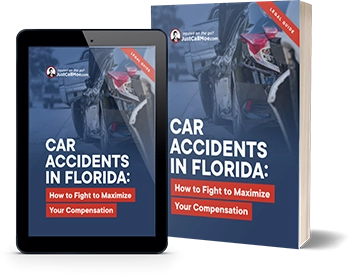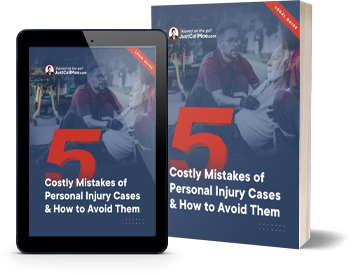The Federal Motor Carrier Safety Administration (FMCSA) has primary responsibility for setting federal trucking regulations in the United States. This agency’s goal is to improve public safety, which means reducing the risk of accidents. Unfortunately, even the best regulations cannot prevent dangerous drivers from getting behind the wheel of a big rig. If you were injured in any collision with a truck, contact an experienced Winter Haven truck accident lawyer. At JustCallMoe, we have tackled some of the toughest truck accident cases, and we use federal regulations to our clients’ advantage.
How Federal Regulations Impact Truck Accident Lawsuits
Obtaining compensation is a complicated process. Helpfully, the federal regulations for truck drivers play a starring role in many injury cases. These regulations often make an accident claim easier to bring.
Federal Regulations Make More Evidence Available
The FMCSA has mandated that trucks have electronic logging devices, which will continuously download information about the truck. These devices have given accident victims and their lawyers an additional source of evidence to use and made winning cases easier.
Before these devices, many truckers used paper logs, which were easy to falsify. A trucker might drive all night but only put 6 or 7 hours down on the log. With electronic devices, we can see with our own eyes how long a trucker has been driving.
A Violation of Federal Trucking Regulations Serves as Proof of Negligence
Injured motorists have the burden of proving the trucker or trucking company was liable for the accident. If these defendants acted negligently, then we can demand that they pay compensation for your economic and non-economic losses.
Federal trucking regulations establish a standard of care that truckers and their employers must follow. When they don’t, we can argue they were negligent per se.
Hours of Service (Maximum Hours)
Because drowsy driving is a major public health hazard, the FMCSA has set maximum hour requirements for truckers. Someone who hauls goods must observe the following limits:
- Maximum of 11 hours of driving in a day. Cannot start driving again until the driver has had at least 10 hours off.
- No driving past the 14th consecutive hour on duty.
- A required 30-minute break after eight hours.
- No more than 60 hours of driving in seven days or 70 hours in eight days.
These federal regulations are designed to give truckers sufficient rest before they head out on the road, so any violation could serve as proof of fatigue.
Physical Exam Requirement
A trucker must pass a physical exam to drive. This requirement ensures that truckers with sleep apnea, high blood pressure, or other medical conditions are not a hazard to public safety. A trucker could have a heart attack behind the wheel and plow into a dozen vehicles. Regular physical exams provide some protection against that unfortunate possibility.
The exam is good for a maximum of two years. After that, a trucker must pass another physical exam, and the trucking company should keep the exam on record. If there were no exam, then we might hold the trucking company liable for letting the trucker into the cab.
Drug Testing
Large trucks can destroy smaller vehicles, causing fatal injuries to occupants. For this reason, a trucker should not have any drugs in their system that impair safe driving, and the FMCSA has mandated multiple layers of drug testing:
- Pre-employment drug screen. A job candidate should pass a drug screen before being hired.
- Random testing. The FMCSA also requires random testing of the workforce throughout the year.
- After accidents, truckers should be tested after most accidents.
- Reasonable suspicion. The trucking company should test a trucker whenever they suspect chemical use or impairment. For example, a manager might smell marijuana on a trucker, so they should require a test.
If a trucker fails, then the employer is supposed to suspend the trucker until completion of a back-to-duty process. When trucking companies cut corners, they might skip this process and just let a trucker back on the highway. A violation of these federal regulations for truck drivers is strong proof of negligence.
Truck Maintenance
Even the most careful trucker can get into a wreck if the vehicle is defective in some way. Perhaps parts are worn out or were not installed properly. Long hauling puts a lot of stress on a vehicle, so it is unsurprising if parts break down.
Some dramatic accidents result when tires blow or brakes fail. Other mechanical problems will make the vehicle unmanageable.
A trucker should perform an inspection both before and after a trip, noting any deficiencies. . When these records are missing, then there is reason to suspect the trucker skipped this step.
Truck Weight Limits
Federal trucking regulations also set weight limits for trucks. These limits are critical for a couple of reasons. First, a heavier truck is more likely to cause catastrophic damage when it crashes. Second, heavier vehicles are harder to control and need more space to come to a full stop. By preventing overloading, the FMCSA promotes public safety.
Unfortunately, some trucking companies have a habit of overloading their vehicles. The more cargo they haul, the fewer trips. If the truck was overloaded, then we might use that fact to argue that the trucking company was negligent. It is one way to establish liability.
Federal Trucking Regulations Require Minimum Insurance
Helpfully, the federal government requires that trucking companies carry minimum insurance.
Currently, companies hauling freight must have at least $750,000 in liability coverage, which can pay compensation to cover a victim’s medical expenses and lost wages. If the truck hauls hazardous materials, then more insurance coverage is required.
Mandatory insurance makes it easier for our legal team to seek financial compensation after an accident.
Reach Out to Our Truck Accident Lawyer
Winning a truck accident case requires detailed knowledge of legal rules, as well as full command of the facts of the case. Get the legal help you need by calling our law firm. JustCallMoe has won trucking accident settlements for clients hurt in truck accidents here in Winter Haven, and we are available to assist anyone with their claim. Contact us today.

 (866) 225-5663
(866) 225-5663



